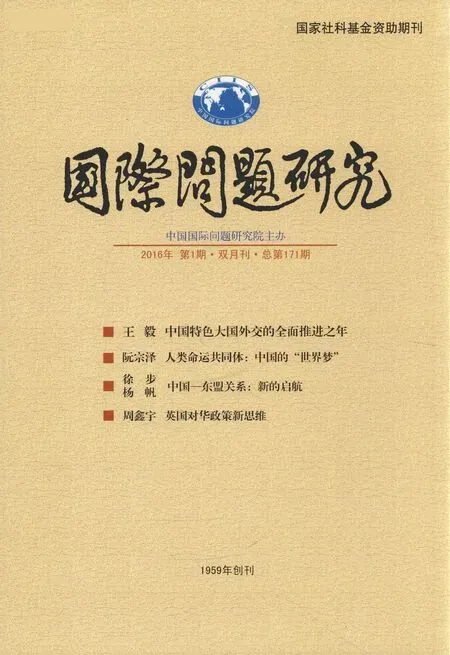Abstracts
?
Abstracts
2015: A Year of Flying Colors for Pursuing Major-Country Diplomacy with Distinctive Chinese Features
Wang Yi
Embracing major changes in both domestic and international environment, China has launched major initiatives and made much progress on the international front in 2015. China’s international standing has been fully raised. China’s diplomacy is advancing on all fronts. China has formed synergy between the development strategies of China and relevant countries. China’s diplomatic theory has been further enriched. The year 2016 will witness the first year for implementing China’s 13th Five-Year Plan, and accelerated adjustment and transformation of the international architecture from a new starting point. China will follow the leadership of the CPC Central Committee, act in accordance with the vision of major-country diplomacy with distinctive Chinese features, and assume due international responsibilities, so as to foster a more favorable external environment for China’s endeavor to finish building a society of initial prosperity in all respects and make more contributions to global peace and development.
Community of Shared Future for the Mankind: China’s World Dream
Ruan Zongze
The “Chinese Dream” of great national renewal and the “World Dream” of a community of shared future for the mankind are China’s two mutually complementary and beneficial visions. The call for a global community of shared future is a vivid representation of China’s major-country diplomacy with distinctive Chinese features, and embodies China’s policy response to the question of what kind of world China pursues when it ranks among the world’s great powers. With great foresight, the initiative provides fresh thinking for the development of international relations in the 21st century, and advances with the times.
UK’s New Thinking on China Policy
Zhou Xinyu
The recent development of China-UK relations has apparently broken through the predicament of the West’s traditional China policy, and taken on new features, especially a transcendence of the duality of economic and value-oriented diplomacy. The UK not only strengthens its economic ties with China, but also engages with China on the political field. This ground-breaking change of UK’s China policy results from both a need of China’s economic dividends and a transformation of strategic and diplomatic thinking. Reflecting on the effectiveness of “ideology stick” against China, the UK reconciliates its economic and value-oriented interests in its China policy, and gradually shapes a self-contained framework. UK’s new China policy may have implications on, and even set an example for, other Western countries.
Global Marathon toward Low Carbon after Paris Agreement
Wang Tian & Li Junfeng
After four years of negotiations, the historic Paris Agreement was finally adopted at the end of 2015, laying foundation for the future global governance of climate change. Nevertheless, due to the particularity of climate change issue, the asynchronous nature of human society’s modernization, the protracted energy restructuring process, as well as differences among countries’ policies and measures, global action on climate change is not a hundred-meter race, but rather a “marathon”. The mode of “intended nationally determined contribution (INDC) plus stocktake” embodied in Paris Agreement has determined the basic rules for this “marathon”. Future implementation of the Agreement should fully respect different national conditions and capacities, and encourage all countries to join low-carbonization process through international cooperation, rather than only limiting emissions from major countries. For China, making efforts to peak earlier with a relatively low cumulative emission is not only to satisfy the internal need to achieve domestic medium and long-term target, but also to prepare for joining and leading the global low-carbon “marathon” in the long run.

